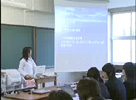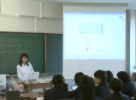
| Place |
 |
□Regular classroom ■Computer room □Special
classroom □Gymnasium
□Athletic Field □Outdoors □Others〔 〕 |
 |
 |
 |
| Type
of Lesson |
 |
■Class ■Group □Pair/Individual □Follow-up □Others〔 〕 |
 |
 |
 |
| Phase |
 |
■Introduction ■Development ■Conclusion □Others〔 〕 |
 |
 |
 |
| Main
user of IT |
 |
■Teacher ■Student □Others〔 〕 |
 |
 |
 |
| Objectives |
 |
■To introduce the topic ■To motivate
students ■As illustrative material used by the teacher ■As illustrative
material used by the student □To master through repetition □To present
a model □To recollect past experiences □To compare ■To examine what
has been done/studied □To provide second-hand experience □Others〔 〕 |
 |
 |
 |
| Equipment |
 |
■Computer ■Projector ■Screen □Electronic
Whiteboard □Visual Presenter □Digital Camera □Video Player ■Internet □Digital
Contents □CD-ROM □Speakers □Others〔 〕 |
|


| Students can browse various materials, not available in
textbooks, on the Internet.They can easily obtain accurate figures in
nutrition calculation without taking time. Also, they can enjoy reviewing
their dietary habits with presentation software. |


Dietary Habit to Prevent Lifestyle-related Diseases
Contents: based on curriculum guidelines
Contents (3) Diseases Prevention and Health Management: A lifestyle-related
diseases and health management for the elderly
* In this lesson, Home Economics contents are dealt with in Social Welfare
Training.


To provide students with an opportunity to review their
dietary habits as well as to understand that late-life health is an extension
of the current dietary habit.
The practical lesson will enable students to have accurate knowledge about
lifestyle-related diseases and use it for their daily health management. |


| (1) |
Explain the overview of this lesson using
presentation software and a projector.
Title “nutrition and health” -> Life and diet -> Meaning of diet
at home -> Guidelines for dietary habits to prevent lifestyle-related
diseases -> Dietary life of the elderly -> Lifestyle-related diseases
and diet -> Review of the cooking lessons in the first term -> PFC(protein,
fat, carbohydrate) ratio -> Problems of modern diet habits -> Food
composition table -> Nutrition calculation method -> Other food
classifications |
| (2) |
Confirm the nutrition analysis data obtained in the cooking
lesson with spreadsheet software (and a projector).
This is to later compare the nutrition analysis done in the cooking lesson
for lifestyle-disease control (diabetes, anemia, hypertension, osteoporosis)
in the first term with the nutrition analysis of a hamburger. |
| (3) |
Use a hamburger as an example to consider the problems
of modern diet habits. In order to calculate the calories and nutrient
factors, a hamburger is broken down into each ingredient, which is weighed
and entered as data onto a worksheet of spreadsheet software for automatic
calculation. In addition, have the students make a PFC pie chart, overwrite
the file onto the pre-distributed floppy disk and submit it to the teacher. |
| |
|
|
[Abstract]
Students are examining the contents of a hamburger. The nutritive
value is being analyzed with a personal computer. |
|
| |
|
| (4) |
Visit the official website of a hamburger company to confirm
if their calculation results correspond to the publicly announced data. |
| |
|
|
[Abstract]
Students are comparing their analysis results with the information
on the nutritive value of a hamburger disclosed by a private enterprise
on the Internet. |
|
| |
|
| (5) |
Introduce ”Nutrition Analysis Navigator”(Glico Co., Ltd.),
another website where students can easily calculate nutritive values. |
| (6) |
Using presentation software and a projector, encourage
students to think about lifestyle-related diseases, food classification,
and dietary life for the elderly. |


| Since students will handle food and computers simultaneously,
warn them at the beginning of the lesson to be careful not to spill any
food or drinks. This lesson does not aim to persuade students not to buy
food that are popular among young people such as hamburgers, French fries,
and coke. Be careful not to create biased views against such food. |


Care Worker Training Course, ‘Introduction
to Home Economics’, Chuohoki Publishing, Ltd.
Junko Shimada et al. eds., ‘Nutrition and Cooking’, Medical Friend Co.,
Ltd.
Yoshiko Kagawa, supervising editor, ‘Food Composition Table, 4th edition’
Kagawa Nutrition University Publishing Division
‘Preparation for the National Exam for Certified Care Workers, 2005’,
Welfare Education Collage
‘New Visual Home Economics’, Jikkyo Shuppann Co., Ltd
‘Home Economics: Complete Teaching Materials for Instructors (Let’s plan
your dietary life and practice)’, Taishukan Co., Ltd.
McDonald’s Japan official website
http://www.mcdonalds.co.jp/
Glico Co., Ltd official website
http://www.glico.co.jp/index.htm |
|


